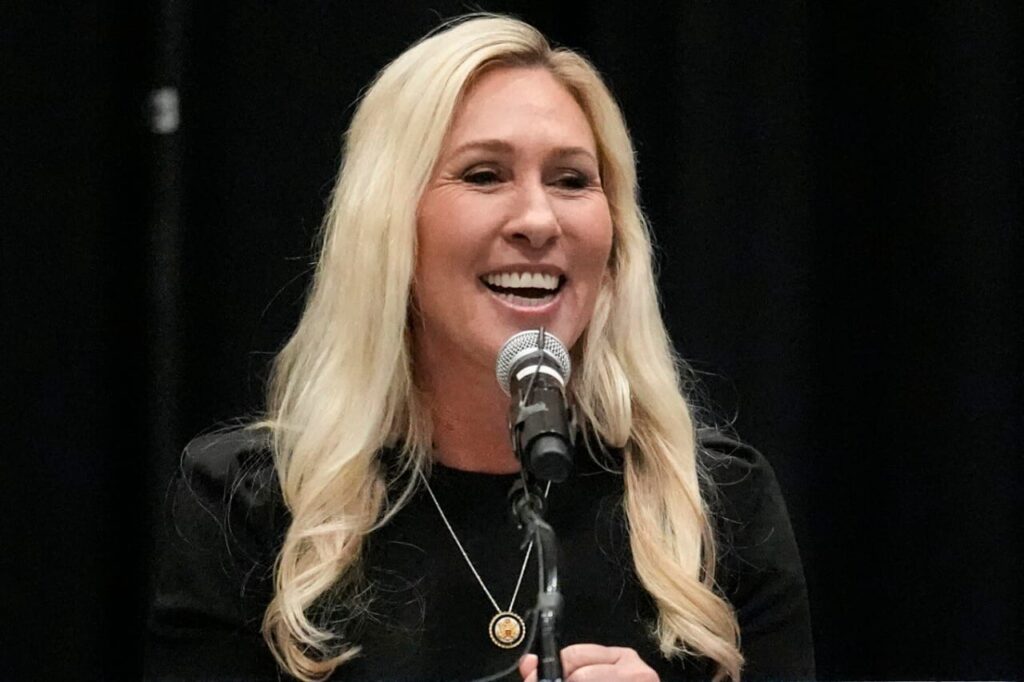Rep. Marjorie Taylor Greene announced Friday that she will not challenge Democratic Sen. Jon Ossoff in Georgia’s high-stakes Senate race next year. The outspoken congresswoman made her decision public in a fiery post on X, where she criticized Senate Republicans for lacking the will to win. “I won’t fight for a team that refuses to win,” Greene declared, signaling frustration with her party’s leadership.
Marjorie Taylor Greene’s decision comes as a surprise to some political observers who saw her as a potential contender, buoyed by her national profile and close ties to former President Donald Trump. Trump had previously voiced strong support for Marjorie Taylor Greene’s possible Senate run, pledging to “fight like hell” to help her win a seat in the upper chamber. Yet despite her high visibility and fundraising prowess, Greene’s polling numbers lagged behind other Republicans, notably Georgia Gov. Brian Kemp, who had already ruled out a bid earlier this week.
Kemp’s Exit and Buddy Carter’s Entry Shake Up GOP Primary
Governor Brian Kemp’s decision not to enter the Senate race earlier this week left a notable void in the Republican primary. Widely viewed as the party’s strongest challenger to Ossoff, Kemp’s departure reshuffled the GOP’s prospects and paved the way for other contenders. Before making his announcement, Kemp reportedly shared his plans with Sen. Tim Scott, chair of the National Republican Senatorial Committee, citing family considerations as a key factor in his decision to stay out.
In the wake of Kemp’s withdrawal, Rep. Buddy Carter officially entered the race Thursday, branding himself a “MAGA Warrior” and aligning closely with Trump’s political agenda. Carter’s candidacy signals a more hardline conservative approach in the primary, a dynamic that could shape the party’s strategy against Ossoff in a state that has become a critical battleground. With Marjorie Taylor Greene stepping aside, Carter is now poised to court Trump’s loyal base, although questions remain about his broader appeal in a general election.
A Critical Senate Seat in a Razor-Thin Battleground
Georgia’s Senate race is set to be one of the most closely watched contests of the 2026 election cycle. Republicans are eyeing the seat as a chance to expand their narrow 53-47 majority, while Democrats are determined to hold it as part of their strategy to reclaim Senate control. Ossoff’s victory in the 2021 runoff, secured by less than two percentage points, underscored Georgia’s shifting political landscape from reliably red to fiercely competitive.
Recent elections have shown just how tight the margins are in the state. In 2022, Democratic Sen. Raphael Warnock won reelection by under three points, reinforcing the unpredictable nature of Georgia’s electorate. With Greene and Kemp out of the running, Republicans must recalibrate their approach to unseat Ossoff, balancing appeals to the Trump-aligned base with efforts to win over moderates and swing voters.
Marjorie Taylor Greene Polarizing Figure Steps Back from the Spotlight

Marjorie Taylor Greene’s choice not to run marks a significant moment in her political trajectory. Since her election in 2020, Greene has become one of the most recognizable — and divisive — figures in Congress, known for her heated rhetoric, far-right positions, and frequent clashes with both Democrats and members of her own party’s leadership. Despite these controversies, she has remained a prolific fundraiser and a prominent voice in the GOP’s Trump-aligned wing.
Her announcement Friday suggested deep dissatisfaction with the Senate Republican establishment, reflecting ongoing tensions between pro-Trump conservatives and party leaders seeking broader appeal. By opting out, Greene avoids what would likely have been a bruising, high-profile campaign, and positions herself to continue wielding influence from the House, where she has been at the center of numerous partisan battles.
The Road Ahead for Georgia Republicans
With Marjorie Taylor Greene and Kemp out, Georgia Republicans face a pivotal decision in selecting a candidate who can unite the party and mount a credible challenge against Ossoff. Buddy Carter’s early entry sets the stage for a potentially crowded and ideologically charged primary, as other contenders may still emerge in the coming months. Analysts suggest the party’s ability to balance its MAGA base with Georgia’s increasingly diverse and suburban electorate will be key to its success.
Meanwhile, speculation continues about Kemp’s political future, with some GOP insiders hinting that he may harbor ambitions for a presidential run or another national role. As the party navigates this transitional moment, the outcome of Georgia’s Senate race will not only impact the Senate’s balance of power but also serve as a barometer for the GOP’s evolving identity in the post-Trump era.














